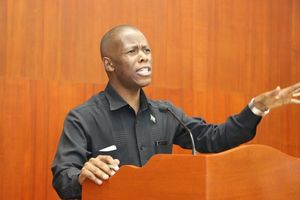Our English, yes, and our Kiswahili too
What you need to know:
A child told his mother that ‘‘ticha’’ had declared that, he would cane pupils who wouldn’t complete their ‘‘homuwaka’’, and a boozer at a bar pressed a barmaid to give him his ‘chenji’.
Fire in small bottles. That’s how a long-deceased veteran Tanzanian politician described electric bulbs. Since the people she was addressing understood what she meant; well, to use modern mobile phone language, it was “message sent.”
Curiously, several years down the line, the newsrooms of local English language newspapers host people for whom the language is meant to be a major stock-in-trade, but who mess it up, as do sign writers, but who, put lightly, are lesser sinners.
It’s something that Abdi Sultani exposes as part of a learning/teaching process in his ‘Our Kind of English’ column. If I referred to part of the dress in his mug shot on the top left-hand corner of this page as a pull-over, he would probably explain that, while I was right, as are the “pullover” and “pull over” versions, one of them was preferable to the other two.
“Murdering” a language is not an offence punishable by hanging or even time in jail; yet, whereas some quarters argue that, doing so in respect of a foreign language is no critical issue, “murdering” our very own Kiswahili is deeply annoying.
Kiswakinge, Kiswangereza; Kiswanglish ?
One form that this takes is the informal ‘marriage’ between English and Kiswahili, which produces “bastard” words and expressions that we embrace and even defend as part of language growth.
Here’s the product of my imaginary day dream, after battling my constitutional lunch entitlement of ugali-samaki (no distortion here; thank God!): A daladala conductor was telling passengers to ‘‘adijasti kidogo’’ to create room for more entrants. Someone insisted to his friend on the phone to ‘kipu taimu’, and another was informing an acquaintance that he was ‘naelekea homu’.
A child told his mother that ‘‘ticha’’ had declared that, he would cane pupils who wouldn’t complete their ‘‘homuwaka’’, and a boozer at a bar pressed a barmaid to give him his ‘chenji’. ‘Huna ishu’, a beautiful girl told off a man making advances at her, while another categorically informed another unlucky man that he wasn’t her ‘saizi’.
Abdi Sultani signs off his columns with the partial resignation note: “Ah, this treacherous language called English.” The same should apply to our beloved… beloved what….Kiswahili, or: Kiswakinge, Kiswangereza; Kiswanglish ?
I am stopping here, because I have a feeling that you will soon complain that I am like, not an MC, but an ‘Em-sii’, who uses, not a microphone, but a ‘maiki’ (what became of ‘kipaza sauti’?) to say a lot of nothing – noisily !



